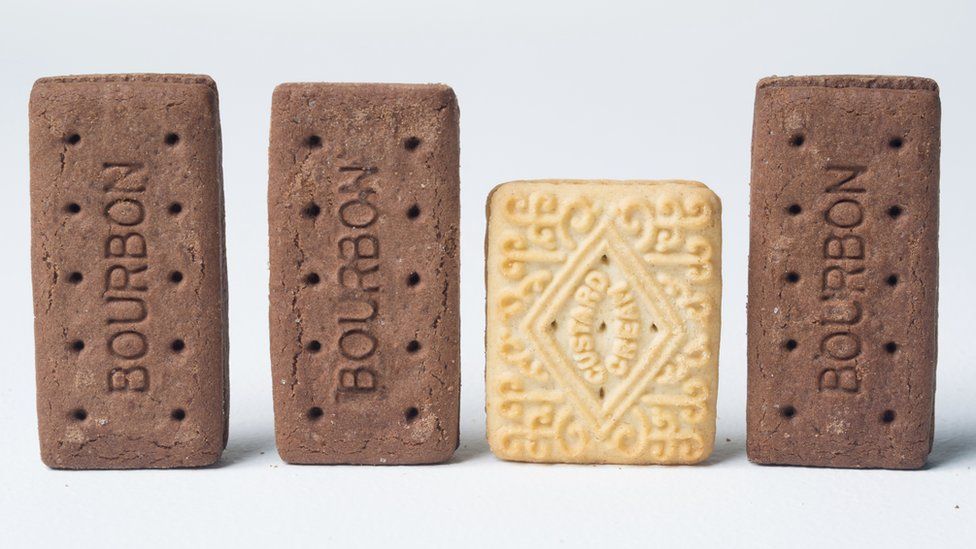How have we coped without biscuits?
- Published

Britain has been experiencing a severe shortage of biscuits - an unforeseen and yet, for some, very serious impact of the recent Cumbria floods. How have we coped?
Storms Desmond and Eva left swathes of Cumbria, Lancashire and Yorkshire under water, causing widespread personal pain and huge economic cost.
They also submerged Carlisle's McVitie's factory ovens, halting production of custard creams, bourbons, ginger nuts and table water biscuits.
Biscuits started disappearing from shop shelves. A nation which had looked on in sympathetic disbelief began to feel the crisis bite closer to home.
Dire circumstances demand a restorative cup of tea and a cup of tea demands a biscuit.
Carlisle artist Lydia Leith, now living in London, knew something was dreadfully wrong when she came home for Christmas and the usual "sweet sugary scented" aroma from the factory was noticeable by its absence.
She said it was "very upsetting".
"When I spoke to my friends about it they didn't believe me and they just thought it was a joke.
"But I guess if they went to the shops and tried to buy some they would realise it was a serious issue."
Used to consuming about 34,000 tonnes of biscuits a month, the British public were suddenly facing gaps on shop shelves.
Several brands were now no longer available. Boasters, water biscuits and other McVitie's, Jacob's, Carr's and Crawford's brands had all suffered one dunking too many.
The UK's biggest biscuit factory was flooded, cutting production of Britain's most loved brands
However, there is now some hope for the British public - production of ginger nuts has restarted and should be back on the shelves by mid March.
Convenience store Nisa's trading controller Julian Smith has apologised to ginger nut-deprived customers for the inconvenience and thanked them for their patience.
McVitie's parent company, United Biscuits, told him the affected lines would be "resurrected in stages" over March and April.
It said previously the complete resumption of production was its "absolute priority".
Sainsbury's, which put signs up in its stores to apologise for supply shortages, has welcomed the good ginger nut news.
Asda however, says the situation has not had a "drastic effect". Perhaps their customers are more stoical - or their stockpiles larger.
There have been 400 people working to get the factory fully up and running, among them suppliers and contractors, not just members of the 640-strong workforce.
Gold Bars are reportedly already back in production; water biscuits are more tricky. Made in traditional brick ovens on the same Caldewgate site they have occupied since 1837, they could not be made anywhere else.
And, since production is normally round the clock anyway, it is hard to see how it could be increased.
The crackers, it is being suggested, will not be back in shops until April. Fans will be leaving the cheese in the fridge a little while longer.
Carr's of Carlisle
A water biscuit history
1831
Jonathan Dodgson Carr starts a bakery business in Carlisle
-
1837 The firm moves to Caldewgate, near the River Caldew
-
1841 Queen Victoria grants a royal warrant - the first for a biscuit maker
-
Late 19th century The firm starts binding the dry ingredients with water instead of fat to keep the biscuits fresh on long sea journeys
-
2011 Carlisle City Council permits the firm to use the authority's coat of arms on its Carr's packaging
It must be remembered, the cost of the flooding has been far greater than just a nation facing a diminished afternoon treat.
Laurence Gibbons, from the food and drink trade publication Food Manufacture, believes United Biscuits is looking at a £50m insurance claim.
Although it is a "pretty big player in the biscuit market" its other factories are "all tailored towards certain products" and could not pick up the slack without a knock-on effect on other brands, he says.
After the 2005 floods, the McVitie's factory got production going again with the help of a £1m government grant.
There is no suggestion a similar payment is in the offing this time, though businesses can bid for £5,000 from a £50m fund pledged by the chancellor.
The company is said to be picking the brains of other firms, in the UK and abroad, to find out how to improve flood protection in the future.
Hopefully, panic-buying and biscuit hoarding will not be necessary next winter but it is worth remembering, just in case, that other kinds of biscuits are available.
As Ms Leith points out, the motto on Carr's water biscuits reads: "Be just and fear not".
Good advice in a biscuit crisis.
- Published3 February 2016
- Published16 January 2016
- Published22 August 2013
- Published10 October 2005
- Published13 April 2005